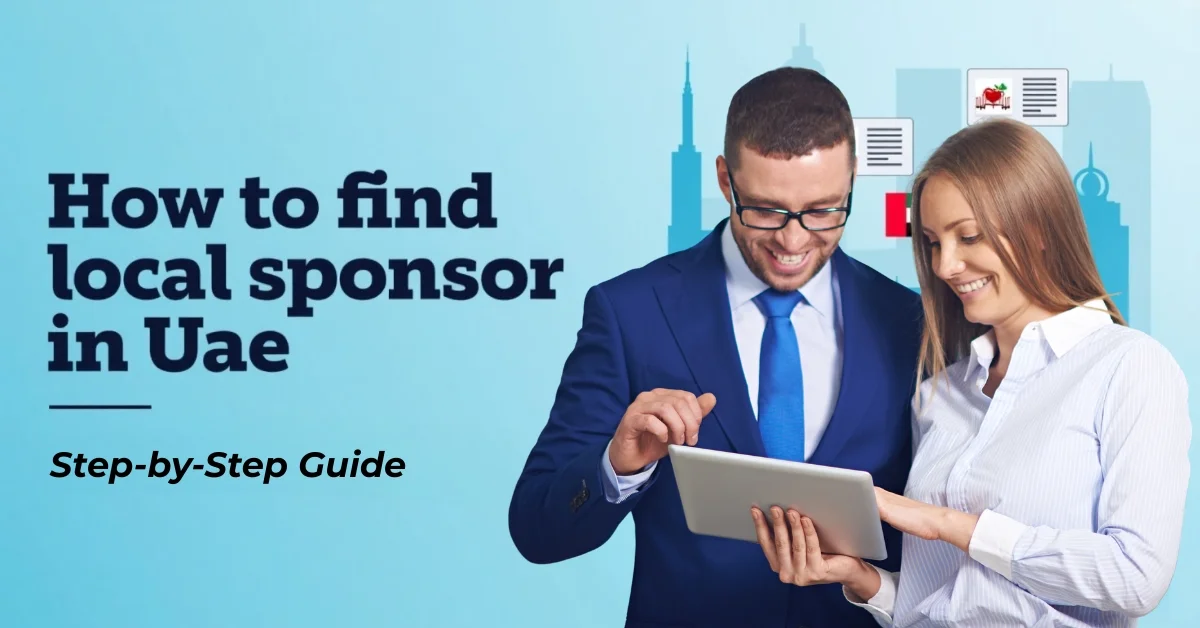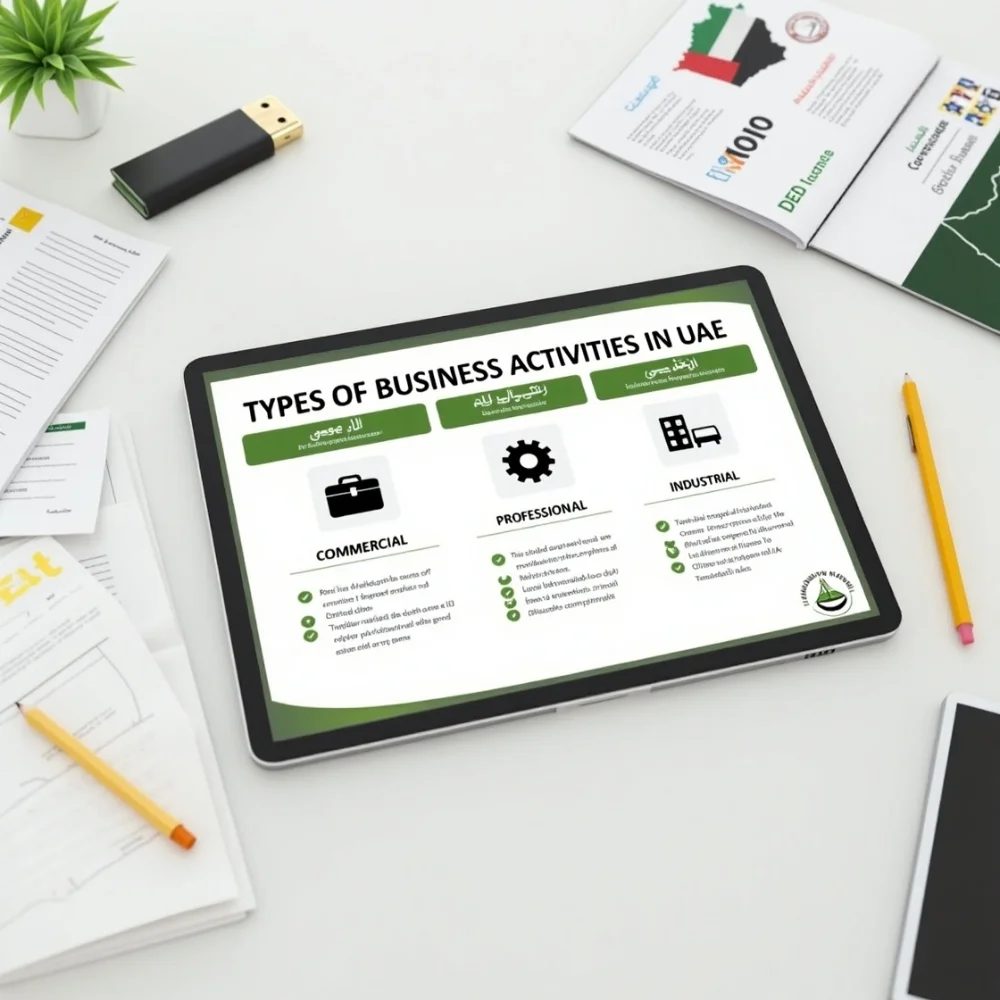
Starting a business in the UAE can be an exciting venture, but if you’re aiming to establish a company in the mainland, one essential requirement remains to find local sponsor. A local sponsor is a UAE national or entity that holds a share in your company under UAE law. This sponsorship structure is vital for many types of businesses in the UAE mainland and serves as a bridge between foreign investors and the local regulatory environment.
Although recent reforms have opened the door to 100% foreign ownership in select business sectors, many activities still require a local sponsor to comply with legal mandates. For investors outside those exempted categories, securing the right local sponsor remains a foundational step toward setting up your business.
What Is a Local Sponsor?

A local sponsor is a UAE citizen or a UAE-owned corporate entity that acts as your partner when you register a business in the mainland. Under UAE commercial law, a local sponsor typically holds 51% of the company shares, while the foreign investor retains the remaining 49%. This arrangement is legally required for businesses in sectors not covered under the 100% foreign ownership reform. The purpose of this structure is to ensure local participation and control in key economic sectors.
Not every business needs a local sponsor. Free zone businesses, for instance, allow for full foreign ownership, and many professional licenses are eligible for different sponsorship models, such as regional service agents. However, if your business plans to operate across the UAE mainland, engage with public contracts, or establish a storefront outside of free zones, then a local sponsor is a legal necessity.
Types of Sponsors
1. Individual Sponsor (Emirati national)
An individual sponsor is a UAE national who holds 51% of the shares in a mainland company, as required by UAE law for certain business activities. This setup is widely used by small to mid-sized commercial companies, retail shops, and general trading businesses. The relationship with an individual sponsor is usually more personal, which can be advantageous for networking and gaining local insights. However, the informal nature of such agreements may introduce risks, especially if no strong legal documentation is in place. Foreign investors must ensure that a Memorandum of Understanding (MoU) and Power of Attorney are drafted to secure operational and financial control.
2. Corporate Sponsor (UAE-owned company)
A corporate sponsor is a UAE-owned company that acts as the 51% local partner in your business. This model of corporate sponsorship in the UAE is growing in popularity among foreign entrepreneurs who value professional, transparent, and legally secure partnerships. Corporate sponsors often have dedicated legal teams, fixed fee structures, and formal service agreements, which make them a safer long-term choice for investors. Though this option may involve a higher initial cost than an individual sponsor, it reduces operational risks and offers consistency. It is ideal for businesses seeking scalability, continuity, and governance.
3. Local Service Agent (LSA) (for professional licenses)
A local service agent is used when setting up a business that qualifies for a professional license, such as consultancy, legal advisory, or engineering services. Unlike sponsors, LSAs do not own any part of the company. Instead, they act as intermediaries to handle government paperwork, licensing, and visa applications. The LSA vs sponsor debate often comes down to ownership. LSAs allow for 100% foreign ownership, while sponsors are mandatory for commercial businesses. LSAs are generally more cost-effective and ideal for solo professionals who want full control of their operations without sharing equity.
Step 1 – Choose Your Business Activity
Before starting a company in the UAE, your first step should be choosing the exact business activity you plan to engage in. This is a critical decision because the type of activity determines the legal structure of your business and whether you’ll need a local sponsor. The UAE government, through the Department of Economic Development (DED), categorizes business activities as commercial, professional, and industrial. For example, if you plan to open a trading company, you will likely require a mainland license and a local sponsor. On the other hand, if your activity falls under professional services like consulting or design, you may be eligible for 100% foreign ownership with a Local Service Agent (LSA) instead of a sponsor.

Step 2 – Decide License Type
The UAE offers three main types of business licenses: Mainland, Free Zone, and Offshore. If your goal is to operate freely across the UAE, including working with government contracts and taking on clients from different emirates, a mainland license is necessary. However, most mainland setups (except for certain sectors under 100% ownership reform) require a local sponsor. In contrast, Free Zone licenses allow for 100% foreign ownership and are ideal if your operations are limited to specific zones or international trade. Offshore companies are used primarily for holding assets, international transactions, or IP management without conducting business inside the UAE.
Step 3 – Shortlist Trusted Sponsors
Finding the right local sponsor is about more than just legal compliance—it’s about building a secure and trustworthy partnership. Look for sponsors who are transparent, credible, and flexible. A trusted sponsor will provide clear terms, have a solid business background, and support your goals without interfering in operations. Corporate sponsors often offer better legal protection and are more professional in their dealings. Be wary of red flags like demands for large upfront fees, vague verbal promises, or reluctance to sign a proper Memorandum of Understanding (MoU). These are signs of untrustworthy sponsors and can lead to future legal or operational issues.
Step 4 – Negotiate the Terms
Once you identify a suitable sponsor, the next step is negotiating the terms of your partnership. This usually includes the annual sponsorship fee, which varies depending on your business activity and the type of sponsor. It’s important to clarify whether your sponsor will be a silent partner (with no role in operations) or one who has some degree of involvement. Most investors prefer silent partnerships, and these can be secured through legal tools like a power of attorney or a side agreement. These documents protect your control over the business while meeting UAE legal requirements. Be clear and detailed in all negotiations, and ensure that both parties understand and agree to the terms before proceeding.
Step 5 – Sign Legal Documents
After finalizing your agreement, it’s time to sign all necessary legal documents. The core agreement is the Sponsor Agreement or Memorandum of Understanding (MoU), which should clearly state the sponsor’s role, your rights, financial obligations, and exit strategies. This document, along with other supporting contracts like a power of attorney, needs to be notarized and registered with the DED. Notarization adds legal weight and ensures enforceability under UAE law. These steps are vital for foreign investors, as they offer legal protections and help avoid disputes.
Step 6 – Complete License Process
With your sponsor documents finalized, you can now complete the business licensing process. This includes registering your trade name, signing a lease agreement for your business location, and obtaining initial approval from the DED. After that, you’ll submit the full set of documents, business plan, sponsor agreement, ID copies, and tenancy contract for the final license issuance. Once your license is approved, you can open a corporate bank account, apply for investor or employee visas, and register for VAT if applicable. This is the final but most crucial phase, and Lukadah offers complete support to ensure smooth execution from document preparation to government coordination, so your business can go live without unnecessary delays.
How to Choose the Best Local Sponsor for Your UAE Business
Finding the right local sponsor is one of the most important steps when setting up a mainland company in the UAE. A good sponsor doesn’t just fulfill legal requirements; they become a strategic partner in helping your business grow while staying compliant. But how do you know who’s the best fit?
1. Assess Credibility and Experience
Start by checking the sponsor’s business history, professional reputation, and legal standing. A credible sponsor will have experience working with foreign investors and a track record of transparent dealings. Always ask for references or case studies, and verify their existing business operations or affiliations. Avoid sponsors who can’t provide clear answers or documentation.
2. Look for Legal Transparency
The best sponsors will be open to signing a detailed Memorandum of Understanding (MoU) or a Power of Attorney agreement that clearly defines roles, rights, and exit clauses. Whether you’re choosing between an individual or a corporate sponsor, legal clarity is key to protecting your control and investment.
3. Evaluate Flexibility and Support
A great sponsor should be flexible with your business model and willing to adapt if your company grows or pivots. Corporate sponsors, in particular, often offer structured service agreements, renewals, and legal support. This makes them ideal for long-term stability.
Common Mistakes to Avoid
Many entrepreneurs make critical errors when selecting a local sponsor, often due to a rush to start the business or a lack of proper guidance. One of the most common mistakes is choosing a sponsor solely based on the lowest fee. While this may seem like a cost-saving move upfront, it often leads to vague agreements, poor communication, and legal vulnerability down the line. Another major pitfall is skipping formal agreements. Without a clear Memorandum of Understanding (MoU) or Power of Attorney, your business could face serious issues, especially when it comes to operational control or ownership protection.
How Lukadah Can Help
At Lukadah, we understand how challenging and confusing it can be to navigate the local sponsorship process in the UAE. That’s why we go beyond the basics. Our team carefully pre-vets both individual and corporate sponsors to ensure you partner with professionals who are trustworthy, experienced, and aligned with your business goals. We handle everything from start to finish, drafting custom legal agreements, coordinating with the Department of Economic Development (DED), and managing notarization and registration steps.
FAQs
1. Can I change my sponsor later?
Yes, you can, but it involves legal procedures, documentation updates, and DED approval. Choosing a flexible agreement from the start makes this process much easier.
2. Is local sponsorship mandatory in Free Zones?
No. Free zones allow 100% foreign ownership, so you don’t need a local sponsor for companies established within them.
3. Will my sponsor have control over my business?
Not necessarily. With proper legal documents like a Power of Attorney and side agreements, you can retain full operational and financial control.
4. What sectors allow 100% foreign ownership?
Sectors such as technology, renewable energy, consulting, education, and agriculture may qualify for 100% ownership under recent UAE reforms. Always check the updated list from DED.
5. How much does local sponsorship cost?
Costs vary depending on the sponsor type, your activity, and legal requirements. Corporate sponsors typically charge more but offer structured agreements and added protection.
Conclusion
Finding the right local sponsor is not just a legal formality; it’s a crucial decision that affects the security, control, and success of your business in the UAE mainland. Whether you’re entering the market for the first time or planning to expand, the right partner makes all the difference. Avoid the common pitfalls by making informed choices and ensuring every agreement is backed by legal protections.
